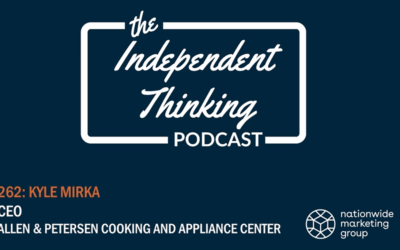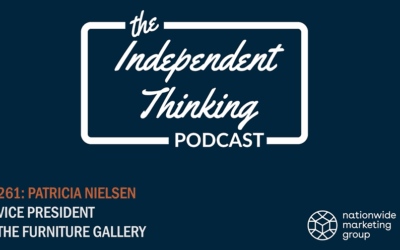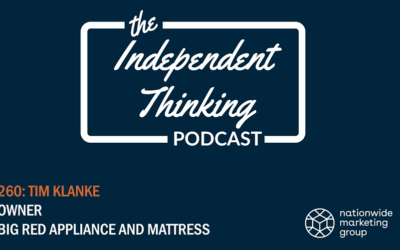Independent furniture retailers faced some major disadvantages during the early days of the COVID-19 pandemic. We spoke through those challenges and more with Furniture Today Senior Editor Powell Slaughter.
Rob Stott: All right, we’re back on the Independent Thinking Podcast and continuing our run through little series here with our trade media partners, and excited today to have on Powell Slaughter, Senior Editor at Furniture Today. Powell, appreciate you under these new working circumstances taking some time out of your schedule, and hopping into your home office, and chatting with us for the podcast.
Powell Slaughter: All right. Well, thanks for having me, Rob. I’m excited.
Rob Stott: You bet, you bet. I think everyone in our space is pretty familiar with Furniture Today and what you guys do, and how important you are to the space, but start by telling us just a little bit about yourself and your background, and then a little bit about Furniture Today as well.
Powell Slaughter: Cool. Well, Furniture Today, of course, is a weekly trade publication where we like to think we’re the leader in the residential home furnishing space for trade journalism. I came to Furniture Today 25 years ago, started off covering some ancillary wood categories and retail technology, and moved over to become case goods editor where I was responsible for all wood furniture.
Was there for 10 years, went to a home furnishings business for the startup there where I was covering retail operations and best practices, and came back to Furniture Today in 2015. I had a couple of furniture categories, but my main focus there was to increase our coverage of the logistics category, which we really stepped up in that a lot. That, and retail finance. Couple years ago though, we had an opening to cover the upholstery beat, which as we know is fairly significant in the industry. They switched me over to that, and I’ve been covering upholstery since April market 2018.
Rob Stott: That’s pretty cool.
Powell Slaughter: But I like to think that with the experience covering retail, logistics, I try to bring some of those supply chain issues into my coverage.
Rob Stott: Gotcha. Now, funny story that we discovered in our talk before hopping on the podcast was that our paths nearly crossed at one point. Something interesting, so NAPCO Media in Philadelphia has a wide variety of trades and industries that get covered, but we just missed each other being coworkers.
Powell Slaughter: Yeah. Well, we finally connected.
Rob Stott: Look at that, what do you know? No, it’s pretty cool. But, obviously, a lot of time spent covering this space and I have to imagine these recent weeks have been some of the most interesting times in the time that you’ve covered this industry.
Powell Slaughter: Yes, indeed. The word unprecedented gets tossed around a lot, but in this case, it’s certainly true. During my career, I was involved in coverage of the petition against wood bedroom, the crash of 2008, 2009 and the recovery out of that, and through all those times, through the economic issues we had 10 years ago, you always had High Point Market. You always had Las Vegas Market. Las Vegas is still scheduled, but we had to cancel the spring market. I was sitting there in April going, “Gee, what am I doing here?” It’s forced changes in everybody. For retailers, for manufacturers, for the way we do our jobs, and everybody’s adjusting. I’ve just never seen anything like this in my lifetime, period.
Rob Stott: Right, right. No, it’s crazy. We’ve had our own changes at Nationwide, having to push PrimeTime and rethink things a little bit. Knowing what this space and what you’re used to, a space that everyone travels a lot. Even though it’s retail, I think there’s a lot more travel than people realize for these small businesses, and not having any of that completely changes the pace, and your regular cadence of what you expect your calendar to look like every year, even quarter to quarter. It’s just been weird. It’s been a weird first half of the year.
Powell Slaughter: Yeah. It’s also been kind of a one-two punch here. For a couple of years we were dealing with the tariff issue, and there was a big disruption in the supply chain as manufacturers moved out of China into places like Vietnam, Cambodia, India, and kind of a rejuvenation in Malaysia and in Egypt, especially for upholstery. The industry there had long experience in wood, but getting ramped up for what was essentially a new category for a lot of people created some issues flowing goods. We felt like we got people figured out how to deal with tariffs, then this COVID-19 hit, which basically threw a big wrench in… Everybody knows Chinese New Year is throughout celebrated in China and Vietnam, but you had all these factories that remained closed after that. There was an issue with the supply chain already there, and this just exacerbated that.
People are starting to get caught up now, but the deal is we had a really good May in retail. This kind of activity in the second quarter is, again, unprecedented. A lot of stores have been closed, maybe some of them who are doing business online and selling off their inventory there, but there was an immediate need for product. For companies that were flowing containers from Asia, that became an issue. We’ve seen a lot more interest in quick ship U.S. warehousing, things like that because right now, we talked about High Point Market being canceled, what I’m hearing right now is that, “Yeah, we always want to see new products, but what we really need to do right now is focus on business. It’s booming right now, we need product now, what can we get?”
Rob Stott: Right. The interesting thing is that, you talk to the other categories as well, the problem seems very similar with how appliances are facing right now as far as supply chain. Not being able to get product here from manufacturers whose plants were shut down for a time or reduced staffing. Those guys, when I say those guys I mean the appliance side, had the benefit of being essential businesses in most cases in this country. They were able to stay open somewhat, but they still faced their own supply chain issues. Whereas, F&B, furniture stores, not always… I’m sure you could speak to this too, weren’t deemed in most cases essential across the country, and presented challenges in and of itself for a lot of these retailers.
Powell Slaughter: I think one of the problems there is that they weren’t deemed essential, but some of these big box stores that were, they were still selling furniture. Furniture retailers were saying, “Hey, why don’t you make these guys rope off this section of the store?” From what I can tell that wasn’t happening, so there was a little bit of a disconnect on I think essential versus non-essential. It was an unfair competitive situation there, but the stores are reopening now, albeit they’re having to do things differently. The whole industry is figuring out how do we do business in this environment, whether that’s on the supply or the retail side.
Rob Stott: You kind of mentioned it too, we could speak from our membership and what they were doing from a digital standpoint, but what else were you seeing? Obviously, there were things like appointment retailing that became an option and is an option still in most cases, chat, digital services like that, but what other strategies or tactics are you seeing retailers take?
Powell Slaughter: You mentioned the chat, I know that when I go to a retailer website the minute I hit that thing, somebody comes on there. I haven’t seen that to that extent, and this wasn’t just at these big companies, this was at some of the smaller maybe independents, some of the regional players, but they had somebody on the line. One thing I think a lot of people if they weren’t already, they’ve had some time to get smarter with online sales, they’re having to figure out how to do that. I think that’s going to be important moving forward for what we call the traditional brick and mortar retailers, that aspect.
Also, something that shows a lot of potential is the buy online, pickup at the store model. You buy it online, you don’t even have to go into the store, and you just go pick it up. I think some of those types of habits, I think consumers could well use those types of things moving forward. And the by appointment, I think that’s going to remain in place, particularly for consumers who have real health issues who might be in a high-risk area. If you offer them the ability to come in and be socially distanced, I think even if stores reopened more fully, I think some people are still going to want appointments.
Rob Stott: And the interesting thing, I heard this talking… It may have been on either on a previous episode or just in talking with others in the NMG team here about what we’ve seen from appointment retailing is that, when someone makes an appointment, it’s not like they’re just coming into browse at that point. They’re already coming in with a mindset that they want to buy. You may be having less foot traffic per se, but the foot traffic that’s coming in, they’re there with checkbooks open, wallets ready to spend, and close rates, those go up. They look a little bit better.
Powell Slaughter: A lot of them know exactly what they want when they come in.
Rob Stott: Exactly. It’s interesting to see that it’s less traffic, but the traffic that’s coming in is almost more… They’re there with a purpose.
Powell Slaughter: Yeah, it’s meaningful traffic. We talked about different ways of doing business, it’s not just at the store, it’s at the market. I think the appointment only is going to be par for the course for a little while. I think until we get a vaccine, we’re going to see a lot of social distancing, virtual shows, one-on-one shows. Here at High Point, we had 150 exhibitors open up in mid-June, it was kind of a critical mass that we were able to get some of the big guys and some of the drive-in, and actually, get to see new product and inline products. We have markets on schedule now, how that’s going to play out? We’ll see. It’s just no telling right now.
Rob Stott: Now, I know new products in furniture, you mentioned those markets, obviously that’s a big chance and usually a big platform for these manufacturers to show off what’s new and coming. Does the lack of physical in-person events mixed with the supply chain issues and what you’ve seen there, does that put on pause any new product launches? What are you hearing from manufacturers as far as their ability to introduce new concepts and things like that in the furniture space because of this?
Powell Slaughter: Well, I think a lot of people just basically took their April intros and said, “We’re going to bring it out in October.” Others took it on the road when they could to retailers that were willing to be open to appointments. You had people flying in retailers to their showrooms to show them new goods. Long term I don’t think you’re going to see a big slow down in the introduction of new products because people are… We hear about consumers who’ve been sitting around looking at the same thing in their homes and then going out and buying furniture. Retailers always want to freshen their floors because if you come into a store or go onto the website or whatever, and keep seeing the same thing over and over, you say, “Okay, well they’ve still got what I saw two months ago.”I think that the flow of the product is going to be different, maybe where they’re sourcing, that’s going to change, but I think you’ll still see a lot of new goods coming out.
Rob Stott: Exactly what you mentioned is something that I know we’ve been hearing a lot about, and that’s this time at home, stores were closed, traffic and in-store sales performance may have been lagging, but all this time that consumers have been sitting at home, they’ve been sitting on their couches. They’ve been eating at the same dinner tables three times a day now, rather than once a day, all that pent up demand. Are you seeing anything yet as far as retailers and brands capitalizing on that?
Powell Slaughter: Yeah. My colleague Tom Russell who covers wood furniture, he’s seen a big spike in dining room sales, which were lagging behind a lot of other categories, that speaks to the point you just made. They’re sitting down there three times a day. One of the other areas we’re seeing a lot of action in is motion, upholstery, sectionals, seating for the family room. Furniture’s of deferrable purchase, and unless you’ve got a mattress that’s breaking your back, you can pretty much get by without purchasing furniture for a while. If you’re on that sofa so much more than you usually are it’s not just a style question, it’s comfort.
Rob Stott: Yeah, you notice those springs poking into you when you’re sitting there Netflixing for eight hours a day.
Powell Slaughter: And the home office, another area that’s shown a lot of potential here now because who’s to say how this working at home wave is going to happen. Me, I wouldn’t want to be in the commercial real estate business right now because I think some companies are going to find out maybe we just need a skeleton crew in here and have people come in and maybe alternate days in the office, maybe come in one day a week in the office. I think you might see, this is not my day job, but you might see a shrinking demand for commercial real estate.
Rob Stott: Interesting. To your point, we’ve taken time at home, from my family’s perspective to reshuffle rooms and figure stuff out, make more efficient use of the space we have, and it’s resulted in some furniture purchases. Just one example of the pent up demand, and the other side too, we’ve been hearing a lot about consumers that with the reduced travel into the office, saving on gas, saving on toll expenses, things like that.
Powell Slaughter: Going out for dinner.
Rob Stott: Yeah, less going out. The savings have gone up, which means that not only is there pent-up demand to purchase new furniture and products, but also those personal coffers are a little more full than maybe they typically are so there’s more cash at hand to spend.
Powell Slaughter: We’ve been talking about that seminar page, and we’ll continue to do so. There’s some good things going on for furniture out there right now. I think what everybody’s wondering is, how long does it last? Maybe we’ll have another strong holiday. Second-quarter usually isn’t that active, but I think that’s what everybody’s waiting, getting ready for good business, I believe.
Rob Stott: For sure, for sure. Kind of changing pace a little bit, obviously you guys do a lot of coverage, you’ve got a lot of stories that you’re popping out every day, lends itself to some cool stories that pop up. Anything that caught you off guard or made you smile in your coverage during this otherwise rough time?
Powell Slaughter: I think overall I’m really proud of the industry on some of the things they’ve done. I cover upholstery, we had dozens of upholstery manufacturers who on a dime converted their operations to produce PPE. I don’t think I said that right, personal protective wear. They jumped right in, and they ramped up really quick. I had a couple of people the way they handled one of the issues that some of these manufacturers are having, particularly some of the larger ones, is that when people went out on unemployment some of them are choosing to stay on unemployment versus come back to the plant. Omnia Leather in California, I’m sure there’s some others, but they paid their employees throughout the shutdown, throughout the furlough, and so they got basically everybody back. They were able to hit the ground running.
In retail, everybody knows Jim McIngvale, Gallery Furniture in Houston, the way he stepped up in previous crises, well, he did it again. He was working with some local nonprofits, he set up the Gallery Furniture Resource Center, which brought in people for job training, food banks, mental health services, vocational schooling. What a great guy. He does it because that’s the way he is, but people in Houston, they aren’t going to forget that. Also, I got to give hats off to you guys. I was looking at your-
Rob Stott: Back to Business hub?
Powell Slaughter: The Shop Safe shops. Getting CDC training to tell people how they can make their consumers feel safe, that’s adding some value there as a marketing group. So, hats off to that. There’s a lot of good things out there. I’ve been around the industry for a long time, it’s got some great people, and it’s people who really care.
Rob Stott: For sure, for sure. It’s the cool thing about the small business side of things is that it is so family-oriented and individual-oriented that you really, as opposed to going into these big box stores where it’s corporate and very ho-hum in the matter of the way they go about things, the Independent Channel really brings out that personal touch. We’re always talking about how that’s something to lean into and use to your advantage as a business, but it really shines in times of need. Gallery Furniture being a Nationwide member is just an awesome example of that. We see that in all sorts of pockets of the country, so it’s cool. It’s cool to see.
Powell Slaughter: Yeah. Also in the different environments that we have these days in stores, I think it really helps if you’re… Some of these dealers, they actually know the people who are coming in. It’s a lot easier to say, “Okay, you got to wear a mask,” when you have that personal relationship. We’ve been hearing about some uncomfortable situations out there, and I think they’re in a good position to deal with that.
Rob Stott: For sure, for sure. Well, I want to bring it back to the one non-COVID question. Use your expertise on the space and things you see coming. As we look ahead to the second half, and the challenges aside, I know we already talked on what they’re going to be the second half, but in terms of the product itself, what types of trends are you looking for and that you think will be prevalent in that these retailers need to keep their eye on as we move into the second half of the year?
Powell Slaughter: I think you’re seeing a pretty big emphasis across the board. Not with everybody, but with some pretty big players, on figuring out how to do a better job of developing goods that work well in the online channel. I was just talking with some motion manufacturers about this opportunity because online is only growing, and this has only thrown gas on that fire. People are getting more comfortable with purchasing large items, but like with motion furniture, that’s a big piece of furniture. It has a big sectional, lots of metal, lots of mechanisms. Some of these guys are taking a more modular approach to the product, but getting a huge array of configurations out of a pretty small number of SKUs.
I think RTA furniture, you’re going to see a lot of real strong development in that. You have a step up in the style. There are some people who are doing it really well right now, but I think you got more… I think you’ve got Bernhardt developing a channel specifically for the e-commerce sales, and that was even before COVID. I think you’re going to see more of that. In upholstery, sectionals are just really big now. I don’t know what your members are hearing, but the retailers I’ve talked with and the manufacturers who have the numbers in front of them, I think anything that brings flexibility in how you configure your room, that’s going to be good. Like a sectional, you can do something for a fairly small apartment on up to a huge open floor plan area. I think those are some things going on right now.
We hear about Made in America a lot, I think there’s some going to be more interest there purely from a logistical standpoint and proximity to market. I think a lot of, especially with things so uncertain, retailers don’t want to invest in too much inventory. If they can get a custom piece or just smaller amounts of inline goods flowed more slowly, that’s going to help importers who are doing U.S. warehousing programs. You’re seeing a lot, a lot of big high cube warehouse operations going up for importers so they can feed that immediate demand. They’re all going to be big guys full of containers, especially when they want to count the retailers, they don’t have a lot of cash right now going into this. May was pretty good, but they’re still getting caught up on their payables.
Rob Stott: That’s crazy. That’s crazy.
Powell Slaughter: I don’t know if that’s of help or not.
Rob Stott: Right. It seems like whether you want to talk about it or not, the COVID thing is going to be here for a while to weed through and work our way through as an industry. It’s nice to have those glimpses of what’s to come and thinking about what’s ahead, but it’s still there in the back of our minds until we can get through this to the other side. Lots to look forward to though, and for all those new product things, obviously, Furniture Today is somewhere that members can turn, people in this industry can turn. You guys got a lot of great stuff and look forward to continuing to follow the coverage. Powell, I appreciate having you on, I appreciate you taking the time and this was fun. Hopefully, we can do it again soon. Maybe in person here before we know it.
Powell Slaughter: Yeah… yeah… this being apart…
Rob Stott: I’ll get one of those. Yeah… and I’ll get one of those extended microphones.
Powell Slaughter: Right. Thanks Rob.
Rob Stott: This was awesome, I appreciate you taking the time.
Powell Slaughter: Okay, thanks for having me.




